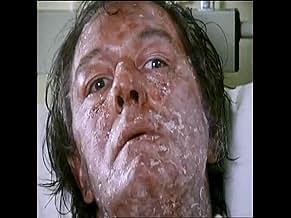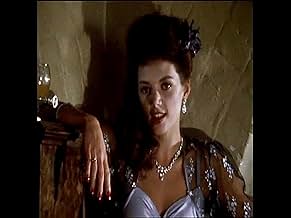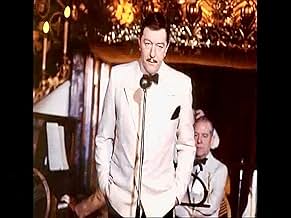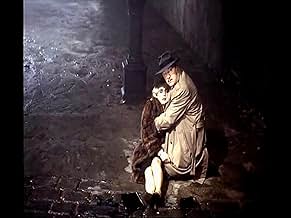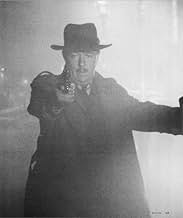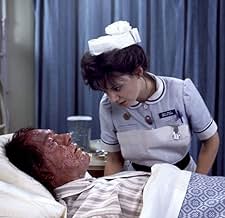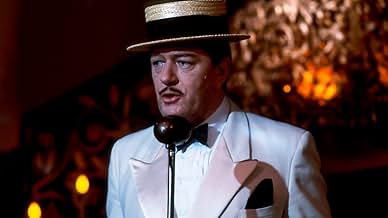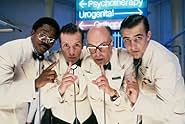Tormented and bedridden by a debilitating disease, a mystery writer relives his detective stories through his imagination and hallucinations.Tormented and bedridden by a debilitating disease, a mystery writer relives his detective stories through his imagination and hallucinations.Tormented and bedridden by a debilitating disease, a mystery writer relives his detective stories through his imagination and hallucinations.
- Won 3 BAFTA Awards
- 6 wins & 8 nominations total
Browse episodes
Featured reviews
Although my comments could belong under the 2003 film version, I choose rather to make the comparison here because the film, more than anything else, gives reinforcement to the view that there are reasons this original miniseries is 6 hours long.
In the original, there really isn't a wasted minute of it's 6-hour running time. The complexity of this man's situation requires that the story reveals several different conflicts in his life simultaneously, and how they relate and resolve through psychiatry, The Singing Detective writing, his relationships (past and present), and the music that had become so important in his life. For the film version, because most of this can't be explored in such a short amount of time, most of these elements aren't included. As a result, the film is light and detached... and forgettable.
Apart from that. as another reviewer here pointed out, the acting and casting is MUCH MUCH better in this original despite the lack of famous handsome Hollywood faces (the 2003 film features Mel Gibson sporting a bald head piece to look like a 'nerdy' psychiatrist!).
I'm not an easy critic, but this version is in my top five of all time (movies, not TV- it feels more like a movie that TV to me). 10 of 10
In the original, there really isn't a wasted minute of it's 6-hour running time. The complexity of this man's situation requires that the story reveals several different conflicts in his life simultaneously, and how they relate and resolve through psychiatry, The Singing Detective writing, his relationships (past and present), and the music that had become so important in his life. For the film version, because most of this can't be explored in such a short amount of time, most of these elements aren't included. As a result, the film is light and detached... and forgettable.
Apart from that. as another reviewer here pointed out, the acting and casting is MUCH MUCH better in this original despite the lack of famous handsome Hollywood faces (the 2003 film features Mel Gibson sporting a bald head piece to look like a 'nerdy' psychiatrist!).
I'm not an easy critic, but this version is in my top five of all time (movies, not TV- it feels more like a movie that TV to me). 10 of 10
About to watch the 'The Singing Detective' in its entirity for the first time in 18 years, one is filled with anticipation but also anxiety. Supposing it's dated, or that its once revolutionary nature has been so widely copied (one thinks here of its multi-layered structure, or the scene where Michael Gambon tries to avoid having an erection) that it will be impossible to remember quite how fresh it seemed on first viewing. Worst of all, perhaps it's simply not as good as remembered? When the piece started slowly, I feared that disappointment indeed awaited. But soon I fell again into its magical rhythmns, and, mesmerised, have just (with the aid of DVD) consumed the final five hours in a single weekend. Mesmerised but not surprised - the power of the piece is such that almost every scene, almost every line of dialogue seemed familiar. The last film I saw I had in fact seen previously, and much less than 18 years before, but I had forgotten it entirely and would not have even realised except for a one memorable detail. By contrast, in Dennis Potter's masterpiece, when a single scene failed to trigger recognition, it seemed horribly wrong, as every other incident was written on my brain.
For those who don't know, 'The Singing Detective' is an offbeat musical about a writer in hospital, that weaves effortlessly his present experiences, his past fictions, his paranoid imaginings and, above all else, the memories of a childhood that to this day still dominates his life. Wildly imaginative, but grounded in Potter's own autobiography, it constitutes an enormously rich and vivid telling of a fundamentally very simple story. Potter celebrates life, but refuses to assign it any false dignity. The extent to which he strips away the cant that helps make life bearable is truly disturbing, and perhaps explains the reason the religious right wanted it banned. The cover of my DVD says 'moderate nudity; mild language; no violence' and by modern standards this is correct. Which only damns the moderns; but Potter knew truly how to shock.
Put simply, everything is right about this series. The dialogue is caustic and hilarious; the direction spot on; the acting brilliant. The song and dance routines are coreographed precisely, economically, but to devastating effect. In fact, the construction of the whole work has the feel of jazz to it, the same themes repeated with minor variation, building to a whole that exceeds the mere parts. And the faces in this drama are the most wonderfully expressive faces you will ever see. I was going to call their expressiveness stylised, in that no-one's real face ever really gives away so much. But these, of course, are the faces of the memory, a lifetime's trauma captured in a single tearful eye.
The cast clearly rose to the material. Gambon gives a virtuoso acting masterclass, supreme in both his roles (he plays both the writer and his creation); and though the writer undergoes a major personal journey during the course of this story, Gambon is as good at the end as at the start. While Joanne Whalley, Bill Paterson (with his beard and accent, he makes me think of Robin Cook!) and (in a virtually silent role) Jim Carter have never done anything better. Often overlooked, meanwhile, is the stunning performance from (the subsequently obscure) Lyndon Davies from as Gambon's younger self.
Potter spent his entire career trying new ways of writing screenplays. It didn't always come off and after this work, little he produced was of merit. But 'The Singing Detective' hits no false notes. If there's been a better series made for television, I haven't seen it.
For those who don't know, 'The Singing Detective' is an offbeat musical about a writer in hospital, that weaves effortlessly his present experiences, his past fictions, his paranoid imaginings and, above all else, the memories of a childhood that to this day still dominates his life. Wildly imaginative, but grounded in Potter's own autobiography, it constitutes an enormously rich and vivid telling of a fundamentally very simple story. Potter celebrates life, but refuses to assign it any false dignity. The extent to which he strips away the cant that helps make life bearable is truly disturbing, and perhaps explains the reason the religious right wanted it banned. The cover of my DVD says 'moderate nudity; mild language; no violence' and by modern standards this is correct. Which only damns the moderns; but Potter knew truly how to shock.
Put simply, everything is right about this series. The dialogue is caustic and hilarious; the direction spot on; the acting brilliant. The song and dance routines are coreographed precisely, economically, but to devastating effect. In fact, the construction of the whole work has the feel of jazz to it, the same themes repeated with minor variation, building to a whole that exceeds the mere parts. And the faces in this drama are the most wonderfully expressive faces you will ever see. I was going to call their expressiveness stylised, in that no-one's real face ever really gives away so much. But these, of course, are the faces of the memory, a lifetime's trauma captured in a single tearful eye.
The cast clearly rose to the material. Gambon gives a virtuoso acting masterclass, supreme in both his roles (he plays both the writer and his creation); and though the writer undergoes a major personal journey during the course of this story, Gambon is as good at the end as at the start. While Joanne Whalley, Bill Paterson (with his beard and accent, he makes me think of Robin Cook!) and (in a virtually silent role) Jim Carter have never done anything better. Often overlooked, meanwhile, is the stunning performance from (the subsequently obscure) Lyndon Davies from as Gambon's younger self.
Potter spent his entire career trying new ways of writing screenplays. It didn't always come off and after this work, little he produced was of merit. But 'The Singing Detective' hits no false notes. If there's been a better series made for television, I haven't seen it.
The BBC television production of "The Singing Detective" caused a huge stir when it was first broadcast back in 1986, and now it is commonly acknowledged as a classic.
Hospitalised by a severe case of psoriasis, crime novelist Philip E Marlow, escapes the grim realities of ward life into a rich inner world where he imagines himself as the "singing detective", hero of his own novels. From these fantasies he drifts to memories of his grim childhood during World War Two, and paranoid fantasies about his estranged wife.
The script, by celebrated writer Dennis Potter, is truly remarkable. The acting is good, especially from Michael Gambon (as Philip Marlow) who is perfect in a very difficult role.
The series lasts nearly seven hours and yet never fails to entertain. The series has a rich vain of dark humour and features some hilariously surreal song-and-dance sequences.
This is a true masterpiece and, very possibly, the best TV series ever made. Don't miss any opportunity to catch it.
Hospitalised by a severe case of psoriasis, crime novelist Philip E Marlow, escapes the grim realities of ward life into a rich inner world where he imagines himself as the "singing detective", hero of his own novels. From these fantasies he drifts to memories of his grim childhood during World War Two, and paranoid fantasies about his estranged wife.
The script, by celebrated writer Dennis Potter, is truly remarkable. The acting is good, especially from Michael Gambon (as Philip Marlow) who is perfect in a very difficult role.
The series lasts nearly seven hours and yet never fails to entertain. The series has a rich vain of dark humour and features some hilariously surreal song-and-dance sequences.
This is a true masterpiece and, very possibly, the best TV series ever made. Don't miss any opportunity to catch it.
A search of the comments on "The Singing Detective" turned up only one mention of Lyndon Davies, who played Philip Marlow aged 10. His performance of this really central character was truly remarkable, and it was essential to establishing the basis for the adult Marlow's problems.
It is amazing that a 10-year-old could play the part, which required, among other things, mastering the country dialect, and showing emotional states so convincingly. Probably John Amiel's direction was an important factor in Lyndon's performance -- as well as that of the other children -- but it was really up to Lyndon's talent to bring it off.
Thanks, Lyndon Davies!
It is amazing that a 10-year-old could play the part, which required, among other things, mastering the country dialect, and showing emotional states so convincingly. Probably John Amiel's direction was an important factor in Lyndon's performance -- as well as that of the other children -- but it was really up to Lyndon's talent to bring it off.
Thanks, Lyndon Davies!
There's no point in reiterating the praise for this miniseries. Many have called it the best television production ever, and as far as I can tell, they're absolutely correct. This is (NBC notwithstanding) the true definition of 'must-see TV'.
I just want to comment on something that struck me when I watched this recently on DVD. There's no way that an actor like Michael Gambon could ever get cast as the leading man in an American production (for TV or movies). He's just not physically attractive enough in the conventional sense; for example, he has the beginnings of a double-chin (more of a sloping-down from his chin to his collar), and I can't imagine any American producer being willing to give such an "not hot" actor so much screen time in the lead role.
Yet, it hardly needs be said, he is 100% perfect in this role, and it's hard to imagine anyone else doing as good a job. He can convey more feeling (rage, helplessness, love, hatred) in one close-up of his eyes than some actors do in their entire careers. His presence in this film is, in a sense, a reminder of how lucky we all are that it ever got made at all, by a BBC that was willing to give producer Kenith Trodd almost complete autonomy, as long as he stayed within budget. With the possible exception of HBO, you just don't see that sort of artistic freedom too often over on this side of the pond.
Anyway, as others said, it's a masterpiece, brilliantly written and brilliantly acted. Truly one of the most incredible uses of the television medium ever.
I just want to comment on something that struck me when I watched this recently on DVD. There's no way that an actor like Michael Gambon could ever get cast as the leading man in an American production (for TV or movies). He's just not physically attractive enough in the conventional sense; for example, he has the beginnings of a double-chin (more of a sloping-down from his chin to his collar), and I can't imagine any American producer being willing to give such an "not hot" actor so much screen time in the lead role.
Yet, it hardly needs be said, he is 100% perfect in this role, and it's hard to imagine anyone else doing as good a job. He can convey more feeling (rage, helplessness, love, hatred) in one close-up of his eyes than some actors do in their entire careers. His presence in this film is, in a sense, a reminder of how lucky we all are that it ever got made at all, by a BBC that was willing to give producer Kenith Trodd almost complete autonomy, as long as he stayed within budget. With the possible exception of HBO, you just don't see that sort of artistic freedom too often over on this side of the pond.
Anyway, as others said, it's a masterpiece, brilliantly written and brilliantly acted. Truly one of the most incredible uses of the television medium ever.
Did you know
- TriviaThe first time Sir Michael Gambon was wheeled onto set in his full make-up, all the cast and crew were reduced to a stunned silence. Gambon broke the ice by saying "What's all this fuss about Chernobyl then? I went there for a holiday and it didn't do me any harm."
- Quotes
Philip Marlow: I used to think that all I wanted was the good opinion of honorable men and the ungrudging love of beautiful women. Now I know for sure that all I really want is a cigarette.
- ConnectionsFeatured in Arena: Dennis Potter (1987)
- SoundtracksPeg o' My Heart
(uncredited)
Music by Fred Fisher
Performed by Max Harris & His Novelty Trio during the credits
Details
Contribute to this page
Suggest an edit or add missing content


